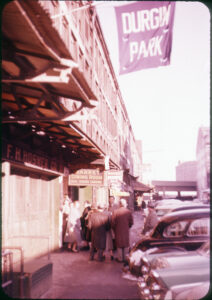By Sharon Oliver, Contributing Writer

The Durgin-Park restaurant at Boston’s Faneuil Hall marketplace served Yankee comfort food with a side of sassy attitude for nearly 200 years.
BOSTON – Durgin-Park’s classic Yankee fare was as satisfying as a grandmother’s hug. Established as a food hall in 1742 by Peter Faneuil, the restaurant located inside was purchased by John G. Chandler, John Durgin and Eldridge Park in 1827 where food was served to fishermen, merchants, and other businessmen. After the deaths of Durgin and Park in 1877, Chandler renamed the eatery Durgin-Park in honor of his partners.
Classic dishes and sassy service
Besides its proud history of being in operation for 192 years, Durgin-Park’s menu also boasted dishes that withstood the test of time. Meals like slow-cooked Yankee pot roast, a 32-ounce cut of tender prime rib, and baked Indian pudding, which cannot be found in many places these days. In an atmosphere of clattering dishes and boisterous conversation, it was the kind of place where everything was made from scratch and the food was so good, they even published a cookbook. It was where generations of families went to share a meal. When Durgin-Park permanently closed its doors on a cold winter’s day in 2019, people came out in droves to take a seat at one of those long, red-checkered tablecloth communal tables one last time.
Even service provided by the waitstaff, who were encouraged to adopt a little of the restaurant’s earlier history of “surly attitude and backtalk,” was something to look forward to. As the story goes, the landmark restaurant tended to hire a lot of older women who did not necessarily need the income but wanted something to do and found working at Durgin-Park to be very social. At the time, many of the customers who came in were men getting off of long shifts who would tend to be rude to them. It got to the point where the waitresses would serve them a little sass right back. Another memorable moment in time may be the blizzard of 1978 when a skeleton crew was snowed in but happily served people for three days.
Speaking about the hordes of people who lined up to dine prior to closing for good, longtime server Gina Schertzer told Forbes magazine, “This is how it was in the ‘70s. At one point in the ‘70s, every single seat was taken by businessmen and produce men who would come in for two-hour lunches,” she recalled. “We still have a few, but most have passed. All of the people who really care about Durgin-Park have surfaced,” including the daughter of Schertzer’s former manager. The woman brought a little bit of her dad’s ashes with her to the restaurant because, she said, “he has to be here.”
Michael Weinstein, CEO of Durgin-Park’s parent company Ark Restaurants, cited the restaurant’s inability to turn a profit as the reason for its shutdown, Schertzer told the website Eater however she had not noticed a significant downturn in her tips.
Popularity waned
However, the restaurant’s popularity did start to wane as more new and modern eateries began to crop up nearby. Eventually, the time came for staff to begin preparations for auctioning off cherished bits of history like old newspaper and magazine clippings from the wall.
The James Beard Foundation awarded Durgin-Park an America’s Classics Award in 1998—the first year the award was introduced. Thanks to its longevity of attracting tourists and repeat customers who placed orders for favorites like fried Ipswich clams, baked scrod and New England corned beef with cabbage, Durgin-Park is clearly one of those “gone but not forgotten” Boston restaurant icons.
RELATED CONTENT:
Hilltop Steak House once ruled Route 1 in Saugus (fiftyplusadvocate.com)
After more than 50 years, Grendel’s Den is still going strong (fiftyplusadvocate.com)
The Massachusetts man who created America’s doughnut habit (fiftyplusadvocate.com)












